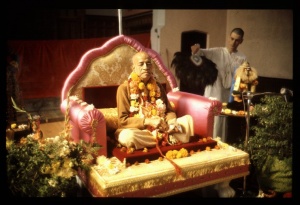CC Madhya 19.176 (1975): Difference between revisions
(Vanibot #0027: CCMirror - Mirror CC's 1996 edition to form a basis for 1975) |
(Vanibot #0020: VersionCompareLinker - added a link to the Version Compare feature) |
||
| Line 2: | Line 2: | ||
<div style="float:left">'''[[Sri Caitanya-caritamrta (1975)|Śrī Caitanya-caritāmṛta (1975)]] - [[CC Madhya (1975)|Madhya-līlā]] - [[CC Madhya 19 (1975)|Chapter 19: Lord Śrī Caitanya Mahāprabhu Instructs Śrīla Rūpa Gosvāmī]]'''</div> | <div style="float:left">'''[[Sri Caitanya-caritamrta (1975)|Śrī Caitanya-caritāmṛta (1975)]] - [[CC Madhya (1975)|Madhya-līlā]] - [[CC Madhya 19 (1975)|Chapter 19: Lord Śrī Caitanya Mahāprabhu Instructs Śrīla Rūpa Gosvāmī]]'''</div> | ||
<div style="float:right">[[File:Go-previous.png|link=CC Madhya 19.175 (1975)|Madhya-līlā 19.175]] '''[[CC Madhya 19.175 (1975)|Madhya-līlā 19.175]] - [[CC Madhya 19.177 (1975)|Madhya-līlā 19.177]]''' [[File:Go-next.png|link=CC Madhya 19.177 (1975)|Madhya-līlā 19.177]]</div> | <div style="float:right">[[File:Go-previous.png|link=CC Madhya 19.175 (1975)|Madhya-līlā 19.175]] '''[[CC Madhya 19.175 (1975)|Madhya-līlā 19.175]] - [[CC Madhya 19.177 (1975)|Madhya-līlā 19.177]]''' [[File:Go-next.png|link=CC Madhya 19.177 (1975)|Madhya-līlā 19.177]]</div> | ||
{{CompareVersions|CC|Madhya 19.176|CC 1975|CC 1996}} | |||
{{RandomImage}} | {{RandomImage}} | ||
==== TEXT 176 ==== | ==== TEXT 176 ==== | ||
| Line 20: | Line 19: | ||
<div class="synonyms"> | <div class="synonyms"> | ||
bhukti—for material enjoyment; mukti—and for liberation from material existence; | bhukti—for material enjoyment; mukti—and for liberation from material existence; spṛhā—desire; yāvat—as long as; piśācī—the witches; hṛdi—within the heart; vartate—remain; tāvat—that long; bhakti—of devotional service; sukhasya—of the happiness; atra—here; katham—how; abhyudayaḥ—awakening; bhavet—can there be. | ||
</div> | </div> | ||
| Line 27: | Line 26: | ||
<div class="translation"> | <div class="translation"> | ||
"The material desire to enjoy the material world and the desire to become liberated from material bondage are considered to be two witches, and they haunt one like ghosts. As long as these witches remain within the heart, how can one feel transcendental bliss? As long as these two witches remain in the heart, there is no possibility of enjoying the transcendental bliss of devotional service. | |||
</div> | </div> | ||
Latest revision as of 11:51, 27 January 2020

A.C. Bhaktivedanta Swami Prabhupada
TEXT 176
- bhukti-mukti-spṛhā yāvat
- piśācī hṛdi vartate
- tāvad bhakti-sukhasyātra
- katham abhyudayo bhavet
SYNONYMS
bhukti—for material enjoyment; mukti—and for liberation from material existence; spṛhā—desire; yāvat—as long as; piśācī—the witches; hṛdi—within the heart; vartate—remain; tāvat—that long; bhakti—of devotional service; sukhasya—of the happiness; atra—here; katham—how; abhyudayaḥ—awakening; bhavet—can there be.
TRANSLATION
"The material desire to enjoy the material world and the desire to become liberated from material bondage are considered to be two witches, and they haunt one like ghosts. As long as these witches remain within the heart, how can one feel transcendental bliss? As long as these two witches remain in the heart, there is no possibility of enjoying the transcendental bliss of devotional service.
PURPORT
This verse is found in the Bhakti-rasāmṛta-sindhu (1.2.22).